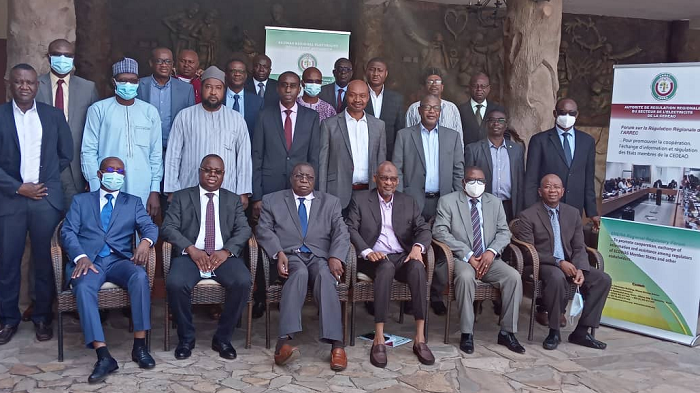
Let's make ECOWAS electricity market operational - Commissioner
The Commissioner in charge of Energy and Mines of the ECOWAS Commission, Mr Sediko Douka, wants ECOWAS member states to work to make the region's electricity market operational so that regular and significant electricity exchanges between member states can begin to strengthen their energy security.
The electricity market would regulate cross-border electricity connections and trading among ECOWAS member states as well as establishing a clear and transparent tariff setting methodology for regional power pooling.
Further, the electricity market would enable the member states to sell their energy at competitive prices since the market would be using the regional transmission lines as well as relying on existing national transmission grids.
ECOWAS Energy institutions
Speaking at the 7th coordination meeting of ECOWAS energy agencies and institutions in charge of energy in Accra on Thursday, May 20, 2021, Mr Douka, said the bloc had serious challenges in its energy sector, hence the need to work to continue the implementation of priority projects of the West African Power Pool (WAPP), such as operationalising the region’s electricity market.
The participating energy institutions and agencies at the meeting were ECOWAS Regional Electricity Regulatory Authority (ERERA), the ECOWAS Centre for Renewable Energy and Energy Efficiency (ECREEE), the West African Power Pool (WAPP), the West African Gas Pipeline Authority (WAPGA) and the Department of Energy and Mines of the ECOWAS Commission.
Meeting
The two-day meeting, which will end on Friday, May 21, 2021, would help the ECOWAS institutions responsible for energy matters to consider the status of energy delivery in West Africa.
Among others, the meeting will specifically receive updates on the status of the ECOWAS Regional Electricity Market over which there has been increased activities, preparatory to the launch of the second phase.
In addition, it will consider the state of implementation of priority projects of the ECOWAS Master Plan 2019 to 2033, the emergency power supply programme as well as the project construction of the WAPP Information and Coordination Centre which based in Calavi near Cotonou in Benin Republic. The ICC will serve as the Systems Operator and Market Operator of the Regional Electricity Market.
Participants will also be briefed on the progress relating to West African Gas Pipeline Operations, the East interconnection at the Ghana level, the new pricing methodology and issues relating to the strengthening of gas supply.
Other issues for consideration at the meeting include: improvement of payment of deliveries of gas supply, strengthening of ECOWAS Regional Electricity Regulatory Authority (ERERA's) human resources and resolving the issue of the headquarters, as well as activities relating to the development of physical renewable energy infrastructure in member states.
Working together
For Mr Douka, having a regional electricity market would help many of the member states to have additional sources of electricity supply, noting that some member states were experiencing structural deficit, resulting in power rationing since there were no alternative power supply.
“In this circumstance, it is imperative for us, considering the financial constraints of our States and of the governing bodies of our Institutions, to be able to strengthen synergy and federate our efforts with a view to achieving economies of scale where possible,” he proposed.
He also urged ECOWAS energy institutions and agencies to intensify the search for funding from donors and increasingly physical infrastructure projects that would help the region to address the daily difficulties of its populations.
Mr Douka expressed the worry that the region’s energy challenges had been compounded by the emergence of COVID-19 which had delayed the implementation of many of the region’s projects essential for improving access to electricity.
The Chairman of ERERA, Prof. Honore Bogler, urged the participating ECOWAS energy institutions in the meeting to continue to work had to help improve the region’s energy supply.
“It only remains for us to get down the task with the seriousness required so that at the end of these two days of work, we can come out strengthened in our ardour to successfully carry out respective activities, in the best possible collaboration and synergy between our different institutions,” he noted.
